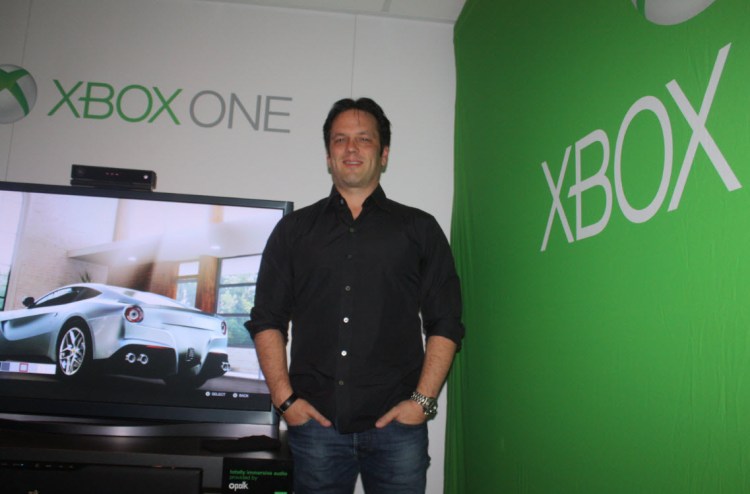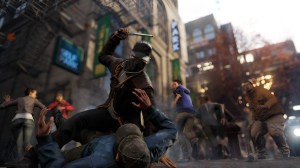GamesBeat: Do you think Kinect is easy enough to develop for now?
Spencer: It is now. We learned a lot with Xbox 360. As you mentioned, it came in halfway through the system’s life cycle. There were a lot of things about the ecosystem that didn’t work well with Kinect. Voice wasn’t always there. It was only available in a game. The dash itself didn’t know at first. You’d fall into experiences where gestures worked and then go to other experiences where it didn’t work. It was very hit or miss.
For a general consumer, things have to always work or they fall out of existence. It’s the same thing with voice. If you have to say “Xbox, watch NBC” five times to get it to work, you’ll just give it up. We’ve done the testing. As soon as the hit rate drops below about 90 percent on these things, voice command in cars or with phones, people just give up.
We’ve learned a lot and invested a lot in Xbox One. One, it’s about making it pervasive, so it’s always there across any experience. Two, the technology is fully available.
 GamesBeat: How is cloud processing turning out as far as its usefulness for developers?
GamesBeat: How is cloud processing turning out as far as its usefulness for developers?
Spencer: You can see experiences here – I can talk about Drivatars, I can talk about Zoo, I can talk about the things we’re doing with Spark – but the real advantages are going to come when you start to see people offloading CPU into the cloud in a real way that impacts the core game loop. There’s some skepticism over whether that will work or not, and I don’t fight the skepticism, because I’d rather have something to show people and a game to build, which is what we’re focused on now.
The other area where there’s a lot of interest is from indie developers. In your garage you have an idea for a service-based game, but maybe you don’t have the financial investment available to go and build a server farm. Now, through our Azure farm, I can apportion to you the load that you need in order to support the number of users playing your game. As that load goes up, on the back end we’ll deal with that. On th e other side, when people stop playing, we’ll decommission those and apportion that CPU capability to whatever’s the hit game at the time. We don’t end up with this depreciation problem, a lot of old hardware that we don’t have anything to do with.
e other side, when people stop playing, we’ll decommission those and apportion that CPU capability to whatever’s the hit game at the time. We don’t end up with this depreciation problem, a lot of old hardware that we don’t have anything to do with.
In the indie space, the cloud is going to unlock a lot more potential for people to think out of the box as far as what indie games have traditionally been. I love my single-player indies. Brothers is probably my game of the year right now. But I also want to unlock the potential for developers on that scale to build a service. There’s a lot of possibility there.
GamesBeat: When people found out the specs on the boxes, they worried that Sony’s games would look better. What do you think the outcome has actually been?
Spencer: For us, in first party, it’s about building the best-looking things we can find on the console, the best experiences. I’m pretty blown away by the work that Crytek’s done with Ryse. It seems to hold up to anything I’ve seen on any console right now. Forza at 1080p and 60 frames per second is going to be the definitive racing sim for this next generation.
We want to put the tools in the hands of developers to build the best experiences. Gamers will look at different videos, and beauty is in the eye of the beholder, so what people like or don’t like will be up to personal perception. But I know that, with the power that’s in the box, we’re able to make the most amazing-looking Studios games we’ve ever put on-screen.
That’s why I like bringing people into a venue like this. Go look at Ryse, at Battlefield, at Call of Duty, at Forza, and tell us what you think. Does it look great? Does it feel great? In the end, people play the games. They don’t play the numbers. Most consumers haven’t had their hands on an Xbox One or a PS4 to feel it. They’re going to use whatever specs they can get hold of to compare the systems. But in the end what’s going to compare the systems is what the games look like on-screen. People will see what we’re able to do with the box.
 GamesBeat: Do you think graphics are still going to be a determinant as far as whether one system sells or the other? Or are we close enough to a place where all graphics are good enough?
GamesBeat: Do you think graphics are still going to be a determinant as far as whether one system sells or the other? Or are we close enough to a place where all graphics are good enough?
Spencer: What I see now is that graphics are being used by the factions that are in place — I love this console, I love that console — to lob hate at each other. Which I think is counterproductive. Sony does a great job. They have a very strong first party. They’re going to build a great piece of hardware. They’ve built a long-standing brand in PlayStation. They deserve the place they occupy in our industry.
Early on, the numbers are just being used as fodder back and forth. I don’t think graphics will be the definitive reason that someone picks a platform over another. It’s more about franchises. If you’re a huge Gran Turismo fan, I don’t think we’re bringing Gran Turismo to Xbox any time soon. If you’re a huge Halo fan, Halo’s not going to Sony or Nintendo.
But also, you and I have been through this enough times to say that the battle’s really not this holiday. This holiday you’re going to see the fans on both sides lining up to pre-order. I think about the next holiday and the holiday after that. It’s when the hardware is in full assortment in both places. Your fans have picked their sides. Then you get more of the gaming fans coming in, who just want to decide which console is better for them. They’ll look at graphics, franchises, but also, does this thing have something for everyone in the family? What’s the meme on the street about this? Is it the winner or the loser? Is it something people love?
The network effect of the Live ecosystem and the different online systems is pretty strong. I think it’ll play out over years, the competition.
GamesBeat: Did you feel any little pang when Ubisoft said Watch Dogs was going to slip?
Spencer: In a way it was less negative for us, because our launch lineup is pretty strong in that genre space. Maybe this is just the corny gamer in me, but I want games to be right. There’s the old saying that you’re only late once, but you’re bad forever. I’d rather they take the time to get the game right, as somebody who wants to go play it.
We have more than 20 games for launch. The amount of great content we’re going to have is high. So I think it’s good for Ubi to take the time with a new IP. I know that it’s difficult for any company to manage slips in big franchises, but for the long run it was the right move for them.
GamesBeat: When you decided which IPs would hit this year versus maybe coming next year, was there a natural sequel cycle that you took into account there? Did other things come into play?
Spencer: It’s different for different games. Let’s pick Ryse, just because it’s been out for a while since E3. You start with trying to find what the game is. That can’t really be scheduled. It takes a lot of iteration time through the concept phase of a game to figure out. Do you have a fun mechanic in place?
When we originally announced the game, it was more about announcing the partnership with Crytek than anything. It was a human walking in the video, if you remember when we first launched it. So Ryse hitting launch happened a little bit later in our life cycle, as we finally found the game we wanted to build. Then we looked ahead and said that launch would be a great time for that. I knew that games like Quantum Break and Sunset Overdrive, based on where we were in the process, would be later. That was fine.
Having a racing game at launch, though, is pretty important. We had Project Gotham Racing on the original Xbox. We had another Project Gotham at the launch of 360. Making sure we have a great racing game available day one has been critical. These are E-rated games. There’s a lot of car racing fans out there. It’s fresh content that anybody can see and play. It shows off a lot of the graphic capabilities of the box.
That was something, talking with the Turn 10 studio about getting a Forza game at launch, which was a little more planned. Luckily we were able to do it. When we did Forza Horizon last year with Playground in the U.K., the thought was that Turn 10 could then get to an Xbox One launch game with Forza 5. It was great that they were able to land it. There’s no guarantee that it’s going to happen, when you try to do the portfolio planning. They’ve done a nice job of landing a great multiplayer and single-player game for day one.


